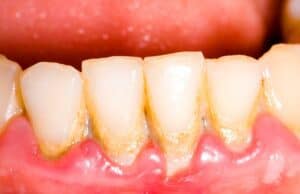Dental plaque is a sticky and colorless bacterial layer that forms on teeth. Especially when teeth are not brushed, the teeth appear stained and create a different sense of the tongue. Recent research shows that the bacteria in the mouth and the inflammations are related to health issues such as heart attack and dementia, significantly affecting a human’s general health.
Why Does Dental Plaque Form and What Are the Harms?
Carbohydrates that we intake in everyday life, such as milk, alcoholic and non-alcoholic beverages, cookies, rice, etc., contain sugar and starch, which create dental plaque when they stay on the teeth for some time. The bacteria inside the mouth start feeding on them and forming acid while developing. Dental plaque starts damaging the enamel and causes cavities. Plaque may develop on roots under dental gum, and plaque that forms on roots might also cause the bone to get destroyed.
Dental plaque is a reason for many gum diseases also. The most common ones are gum inflammation, bleeding on the gum, and sensitive gum. In time, gum diseases develop more and become more significant problems. The gum recedes back, and bacteria reach more towards the bone.
The bacteria that live inside the mouth and enter the bloodstream might cause heart disease, diabetes, dementia, rheumatic joint inflammation, premature birth, and more. Inflammation-related periodontal diseases increase Inflammation in the body, and Inflammation is the underlying cause of heart diseases and rheumatoid arthritis.
The risk of having lousy heart health and heart attack for people with gum diseases is higher than for others. For people with diabetes, it’s more likely that those patients also deal with gum diseases. The main reason is Inflammation. People dealing with diabetes have a higher risk of getting an infection too. If you don’t have your diabetes under control, the risk percentage of having gum disease is more elevated.

How to Avoid Dental Plaque?
Just like every illness, it’s essential, in this case, to prevent dental plaque before it becomes apparent. Even if you don’t have dental plaque, your mouth and body would appreciate you paying attention to some points regarding mouth health. If you don’t want the dental plaque to form more severe cases:
- Brush your teeth two times a day with special care. Brushing after every meal would prevent plaque at a higher rate.
- Make sure to have your brush with soft bristles.
- Pay extra attention to brushing the area where your teeth and gum meet, and make sure it’s properly cleaned.
- I prefer to use toothpaste with fluorine in it.
- To reach where a brush can’t, floss once daily to clean off the food pieces and bacteria properly.
- The bacteria causing gum diseases develop from dental plaque. So the bacteria will be cleaned up if you use an antiseptic mouthwash.
- See your dentist every six months for a general checkup and teeth cleaning.
- Have a healthier diet and avoid snacking in between meals as much as possible. If you have to snack, you should prefer healthy food like yogurt, cheese, fruit, etc.



